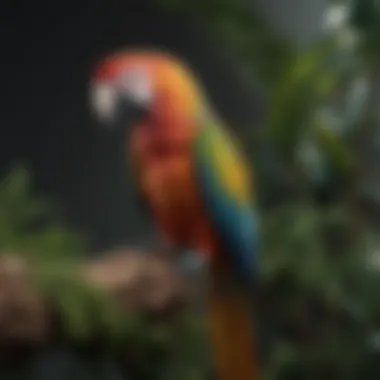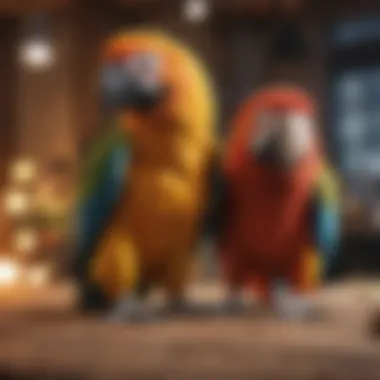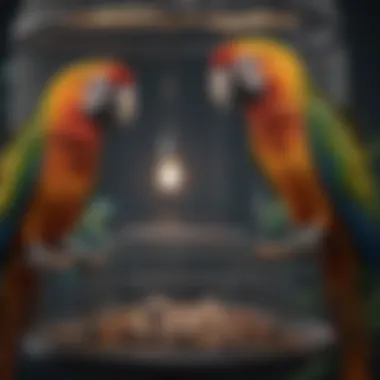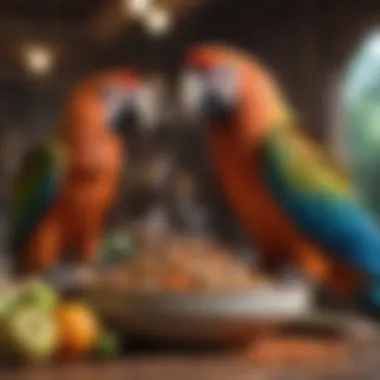Understanding the Cost of Macaw Parrots: A Comprehensive Guide


Intro
Owning a macaw parrot is not just about the initial excitement of bringing a vibrant, colorful bird into your home. It involves careful consideration of numerous financial responsibilities, both upfront and ongoing. This guide aims to provide a detailed exploration of these costs and the implications of macaw care. By understanding the financial aspects, potential owners can make informed decisions and prepare for the long-term commitment associated with these remarkable creatures.
Understanding Your Pet
Understanding a macaw's needs is crucial for both their wellbeing and your financial planning. Their behavior, characteristics, and species-specific requirements significantly impact their maintenance costs.
Pet Behavior Basics
Macaws are known for their intelligent and social nature. They thrive on interaction and can develop strong bonds with their owners. However, their social needs can lead to additional expenses, especially if they experience loneliness or boredom, which could prompt undesirable behaviors. Developing a consistent routine can mitigate these problems, but it requires time and effort from the owner.
Common Breed Characteristics
Different species of macaws exhibit distinct traits. For example, the Blue-and-yellow Macaw has a playful demeanor, while the Scarlet Macaw is known for its vocal abilities. Understanding these characteristics is essential when selecting a breed that fits your lifestyle, particularly considering costs associated with care, housing, and enrichment tailored to each breed's needs.
Species-Specific Needs
Each macaw species has unique dietary and habitat needs. For example, some may require larger enclosures, specific types of toys to stimulate their minds, or a particular diet rich in fruits, nuts, and seeds. These requirements can significantly influence overall costs of ownership, as specialized diets and equipment often come at a premium.
Pet Care and Maintenance
Proper maintenance of macaws is vital for their health. This section will address essential aspects of daily care that come with financial implications.
Feeding Guidelines
Macaws require a balanced diet to thrive. A quality commercial diet supplemented with fresh fruits and vegetables should be the foundation. The cost of food will vary depending on the macaw's size and dietary needs.
Grooming Essentials
Regular grooming is necessary to keep a macaw's feathers in good condition. This includes nail trimming, feather care, and beak maintenance. Investing in grooming supplies or scheduling regular appointments with a professional may influence monthly costs.
Hygiene Practices
Maintaining hygiene in a macaw's environment is critical. Regular cage cleaning, fresh water supply, and safe toys will incur ongoing expenses. Setting aside budget for cleaning supplies is essential to ensure your pet remains healthy and happy.
Training and Development
Training is crucial for both the owner and the macaw. It ensures a harmonious relationship and helps to prevent future behavioral issues.
Basic Commands and Skills
Teaching basic commands such as


Prolusion to Macaw Parrots
The decision to own a macaw parrot is significant, both emotionally and financially. This article serves as a comprehensive overview of what potential owners should know about these intelligent birds. Understanding their needs, behaviors, and the costs associated with their care is essential before making a commitment.
Overview of Macaw Species
Macaws belong to the family Psittacidae, a vibrant and diverse group notable for their size and striking plumage. There are several species of macaws, varying in size, color, and temperament. Each species has unique characteristics that can influence a potential owner's choice. For instance, the Blue-and-yellow Macaw, known for its rich colors and playful nature, contrasts with the more reserved Green-winged Macaw. Understanding these differences can help owners select a species that fits their lifestyle and living environment.
Moreover, the lifespan of macaws is quite long, often exceeding fifty years in captivity. This longevity means that owning a macaw is not just a short-term commitment but a lifelong responsibility. Familiarizing oneself with the different species also aids in preparing for the specific care requirements they need. A deeper understanding enhances the owner-bird bond and ensures a happier life for the bird.
Popularity Among Pet Owners
Macaws are among the most popular pet birds. Their striking colors and engaging personalities captivate many individuals and families. The popularity can be attributed to several factors. Firstly, their intelligence level is quite high. They can learn tricks, talk, and even solve simple puzzles. This ability to engage with their owners provides both enjoyment and companionship.
Furthermore, macaws are social creatures. They thrive on interaction and can form strong bonds with people. This makes them appealing to families or anyone looking for a loving and involved pet. Their playful behavior often ensures they remain an engaging presence in any home.
However, it is crucial to note that their popularity comes with responsibilities. Owning a macaw requires a significant commitment in terms of time, effort, and financial resources. Prospective owners should thoroughly research not just the joys of owning a macaw but the challenges as well. By understanding this balance, individuals can make more informed decisions about bringing a macaw into their lives.
Initial Cost of Purchasing a Macaw Parrot
The initial cost of purchasing a macaw parrot is one of the most significant financial commitments involved in their ownership. Understanding this cost is essential for potential owners. It provides clarity on what to expect financially before bringing a macaw into the home. An informed decision can lead to a more successful relationship with these intelligent birds.
Factors Influencing Purchase Price
Several factors can impact the purchase price of a macaw. One primary consideration is the species. Different species of macaws vary in cost due to their rarity, size, and popularity. For example, a Blue and Gold Macaw might be less expensive than a Hyacinth Macaw, which is less common.
Age is another influencing factor. A younger macaw often comes with a higher price tag compared to an older bird. Young birds may require more time, care, and training, which can justify the higher initial cost. Additionally, the bird's health, including its breeding history, can affect price. Healthy birds from reputable sources tend to cost more, reflecting their quality.
Market trends also play a role in pricing. The availability of specific species in a given area can lead to fluctuations in cost. Owners should be aware of these market dynamics when deciding on a macaw.
Average Pricing by Species
The average price of macaw parrots varies widely based on their species. Here is a basic overview of average pricing:
- Blue and Gold Macaw: Typically ranges from $1,000 to $2,000.
- Green-Winged Macaw: Can usually cost between $1,500 to $3,000.
- Scarlet Macaw: Often priced around $2,000 to $3,500.
- Hyacinth Macaw: Known for being among the most expensive, prices range from $5,000 to $15,000.
These prices may fluctuate depending on location and availability. It's important for potential owners to research specific species and their current market value.
Reputable Breeders vs.
Pet Stores
Choosing where to purchase a macaw parrot can greatly affect the initial cost. Each option has its own benefits and drawbacks. Reputable breeders often charge a higher price but usually provide birds with verified health records and proper socialization. This upfront investment can lead to fewer surprises down the line.
In contrast, pet stores may offer lower purchase prices, but the birds might not come with detailed health histories. Moreover, the environment in a pet store can be stressful for birds, which might contribute to underlying health issues.


Buying from a breeder allows for personalized advice and care tips. Therefore, investing with a reputable source may save money in the long run due to better health and behavior outcomes.
"Choosing the right source is critical; health and temperament of the bird matter as much as the price."
Before purchasing a macaw, potential owners need to consider these factors carefully. Research local breeders and assess their reputations. The cost of initial purchase is just one step in the journey of macaw ownership, and making the right choice can impact overall costs and experiences.
Ongoing Costs of Macaw Ownership
Owning a macaw parrot carries responsibilities beyond the initial purchase price. Understanding the ongoing costs is vital for prospective owners. These costs include food, healthcare, and supplies. Evaluating these expenses helps potential owners plan effectively for long-term financial commitment. Knowing these factors ensures a sustainable and fulfilling relationship with a macaw.
Food and Nutrition Expenses
Food is a significant part of macaw ownership. A balanced diet is critical for the health and vitality of these birds. Macaws require high-quality pellets mixed with fruits, vegetables, and nuts. The total cost of food can vary based on dietary preferences and the size of the bird. Owners should expect to spend between $30 to $50 a month on nutrition. Investing in quality food not only contributes to a macaw's physical health but also enhances its mental well-being. Along with daily meals, consider variability in supply depending on seasonal availability of fresh produce.
Health Care and Vet Costs
Regular veterinary check-ups are essential for macaw ownership. Just like any other pet, regular examinations prevent health issues. Vet visits can cost from $50 to $150, depending on services needed. Routine care includes vaccinations, avian dental care, and illness treatment. Emergency vet care can be more costly. Owners should have a budget for unexpected issues, which could run into several hundred dollars. Investing in preventive care can save money in the long run and keep your macaw healthy.
Supplies and Accessories
Types of Cages
The type of cage for a macaw is a significant expense. Cages should be spacious to allow movement, with horizontal bars for climbing. A good cage costs between $200 to $1,500 depending on size and features. A high-quality cage promotes safety and comfort. Many owners prefer large cages with ample space, which offer better aesthetics and reduce boredom. Some cages even have additional features like removable trays for easy cleaning. However, while investing in a high-quality cage is crucial, it's important to find a balance between quality and affordability.
Toys and Enrichment
Toys and other enrichment items are another critical aspect of macaw care. These birds are intelligent and require stimulation. Toys can range from simple wood blocks to elaborate puzzles, costing anywhere from $10 to $100. Regularly replacing and rotating toys prevents boredom and encourages natural behaviors. Enrichment items like climbing ropes and swings contribute positively to a macaw’s environment. Budgeting for these items is necessary, as they ensure mental and physical well-being for your pet, ultimately leading to a happier and healthier bird.
Insurance Considerations
Insurance can play a role in covering unexpected veterinary costs. While not all owners choose this route, it is worth considering. Avian insurance plans vary widely, from basic coverage for routine care to more comprehensive plans for emergency situations. Monthly premiums might range from $10 to $50. An insurance plan can provide peace of mind and financial support during unexpected emergencies. As with all ongoing costs, understanding the pros and cons of pet insurance is essential for responsible macaw ownership.
Less Obvious Costs of Macaw Care
Owning a macaw parrot is an enduring commitment that extends beyond the initial purchase and basic care expenses. Understanding less obvious costs is crucial for prospective owners. Failing to consider these factors can lead to unexpected financial strain. Hence, it is important to carefully evaluate the various areas where costs can arise, enhancing the overall ownership experience.
Training and Socialization Investments
Training macaws requires significant time, effort, and often money. Unlike some other pets, macaws are highly intelligent and social creatures. They thrive on interaction and engagement. They benefit immensely from training that encompasses both basic obedience and advanced tricks. This process not only fosters a strong bond between the bird and owner but also helps in preventing behavioral issues that may arise due to boredom or frustration.
Investing in professional training sessions can enhance the learning instead of relying solely on self-training methods. Rates for professional trainers may vary. However, it is generally wise to consider this investment early in one’s ownership journey, as it can pay dividends in a more manageable pet in the long run.
Travel and Boarding Expenses


Travel can pose additional challenges for macaw owners. Unlike cats or dogs, birds often require specialized boarding facilities. When you travel, finding suitable accommodations for your macaw can add to your costs. Some kennels or boarding services may not be familiar with the needs of exotic birds, requiring you to seek out specialists who understand their care. Costs for such services can range significantly depending on the facility and the duration of stay.
Furthermore, if you were to travel frequently, long-term planning for your macaw's care becomes essential. You may also want to consider pet-sitting services that are familiar with handling macaws. This can add extra costs but ensures the well-being of your bird during your absence.
Potential Property Damage
Another often overlooked cost is the potential for property damage. Macaws are known for their strong beaks and curious nature. They can chew on furniture, wires, and other household items if left unsupervised. This behavior can lead to costly repairs or replacements over time. For example, native wood furnishings may become a target for their chewing tendencies.
To mitigate this risk, owners should invest in safe toys that are designed for chewing. Additionally, providing designated areas for play can help keep your home intact. Establishing boundaries early can prevent property damage, yet some initial investment may be necessary to set up an environment that keeps both your bird and your belongings safe.
In summary, understanding these less obvious costs is crucial for prospective macaw owners. Consider training expenses, travel needs, and the potential for property damage. Each factor plays a significant role in the total cost of ownership. Being aware of them ahead of time can lead to a more enriching and fulfilling experience with these vibrant and intelligent birds.
Budgeting for Macaw Parrot Ownership
Budgeting for macaw parrot ownership is a crucial aspect that can determine the well-being of the bird and the owner's financial stability. Macaws are not just pets; they are long-term companions that require a significant investment of time and money. Understanding the costs involved helps potential owners prepare better and avoid unexpected financial burdens. By creating a structured budget, one can ensure proper care for the bird while effectively managing personal finances.
Creating a Comprehensive Budget
To create a comprehensive budget for macaw ownership, one must consider various categories of expenses. This includes initial costs like the purchase price and ongoing operational costs. Here are key elements to include in your budget:
- Purchase Price: Start by determining the price of the macaw itself, which varies by species and breeder. Some macaws can cost several thousand dollars.
- Monthly Food Costs: A macaw's diet is crucial for its health. Allocate funds for fresh fruits, vegetables, and high-quality pellets each month.
- Healthcare Expenses: Routine vet visits and emergency care are vital. Research average costs in your area to include in your budget.
- Supplies: Include one-time expenses for a suitable cage, toys, and perches, as well as ongoing costs for replacing worn items.
- Training: If professional training is desired, factor in their costs.
Creating this budget should mean reviewing your monthly and yearly income versus expenses to ensure you are prepared for the long term.
Long-term Financial Planning
Long-term financial planning is essential for macaw parrot ownership. Since macaws can live for over 50 years, one must consider ongoing costs throughout their lifespan. Here are some points to consider for effective planning:
- Savings Accounts: Establish a savings account specifically for bird care to cover unexpected veterinary costs or emergency situations.
- Insurance: Look into pet insurance options designed for birds. This might help spread out some costs related to medical care.
- Future Expenses: Anticipate potential future costs, such as habitat upgrades and special dietary needs as the bird ages.
- Educational Expenses: Set aside funds for education on avian care, such as training courses or literature, to enhance your ownership experience.
Remember, proper planning avoids sudden financial strain and ensures a stable environment for your macaw.
Proper budgeting lays a strong foundation for macaw ownership, fostering both financial responsibility and compassionate care.
End
In the journey of understanding the financial obligations involved in macaw ownership, this article has examined various aspects critical to potential and current owners. Comprehending these cost factors is not merely a financial exercise; it is central to ensuring that macaws receive the care, environment, and attention they deserve.
The costs associated with macaws extend beyond initial purchase prices and ongoing care. With responsibilities ranging from food and health care to training and socialization, prospective owners must be ready for a long-term commitment. This analysis serves not just to inform but to encourage thoughtful consideration of the overall financial landscape surrounding macaw ownership.
Deciding to bring a macaw into one’s life is an impactful choice. It can bring joy, companionship, and a unique bond that transforms everyday life. However, it is equally vital to recognize the implications of this relationship. By establishing a comprehensive budget that encompasses all probable costs, one can create a sustainable living situation that benefits both macaw and owner.
Ultimately, being aware of all potential expenses involved in macaw ownership equips future owners to create a nurturing home for these intelligent birds. As you take the step toward owning a macaw parrot, consider not only the upfront costs but also the ongoing financial and emotional investments required to ensure a thriving partnership. Understanding this comprehensive picture reinforces the idea that owning a macaw is a significant commitment, both financially and emotionally, yet it is also incredibly rewarding.
Final Thoughts on Cost Considerations
Owning a macaw parrot is undeniably appealing, yet entails serious financial considerations. Each element contributes to the overall well-being of the bird and the satisfaction of the owner. It is crucial to approach this journey with awareness and preparedness.
The immediate costs, such as purchasing a macaw, can be high. However, ongoing costs associated with food, healthcare, and accessories can accumulate substantially over time. Moreover, less obvious implications such as potential property damage or travel expenses further complicate the assessment of financial readiness.
Moreover, engage actively with the macaw community. Online platforms like Reddit can provide anecdotal insights into the day-to-day costs experienced by current owners and offer advice on budget management from those who have navigated similar paths.







